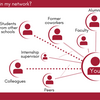What is networking? Networking is the action or process of interacting with others to exchange information and develop professional or social contacts.
Connecting with new people in person can be exhilarating and/or exhausting depending on your personality. Regardless, you should take the opportunity to develop and build your network. You never know who you might meet at the event!
Networking is simply a conversation! While there is a time and place for a more formal “pitch” most often you will be at an event and chatting with a variety of people from different backgrounds. Be ready to talk a bit about yourself including your university, major, career interests/goals, and an interesting fun fact.


